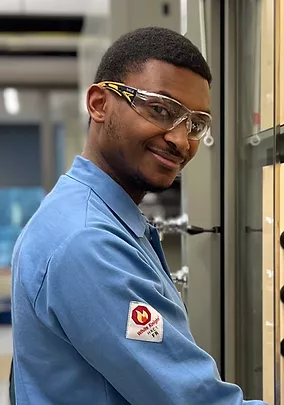ARCS Illinois Chapter Scholar Hendryck Gellineau can trace the “aha” moments that led to his current career path in science.
It began when he was in high school and attended a compelling national STEM-driven program called Project Lead the Way, “I got introduced to microbiology, to immunology, and a lot of other cool topics in biology in general,” Gellineau explains. “I thought it was the coolest thing ever -- how can we manipulate things that are so small?”
These moments continued while he was an undergraduate at Cornell University. Gellineau says he “read an article about using copper in hospital doorknobs, and how that prevented the spread of infection because the copper surface of these doorknobs was antibacterial.” That article led to meeting his first research mentor, and “that really set me on the path.”
Gellineau is now in his fifth year of the MD-PhD program at Northwestern University’s Feinberg School of Medicine while simultaneously studying organic chemistry as a third-year graduate student. A Danaher National Impact Award funded his ARCS Scholar Award.
Gellineau’s research focuses on metal-based drugs and their potential as antibiotics. Cisplatin, a platinum-based drug, is one example. It is very commonly used as an anti-cancer agent. “It is a metal-based drug, the most recognized one we use in clinical settings. And there's so much interest in chemistry beyond just those of platinum,” Gellineau says.
Organic chemistry appeals to his visual learning style, but he also wants to tap into the potential of inorganic chemistry. His research focuses explicitly on cobalt and “to determine if we can harness its antibacterial activity because it also has some interesting chemistries.”
Gellineau aims to modify the organic cage that fits around the cobalt ion so he can target metallo-beta-lactamase specifically. “These enzymes chew up drugs like penicillin, preventing them from working. Through my work, I will develop a new inhibitor to be administered with penicillin and the different other derivatives of penicillin. Stopping this enzyme can get these drugs to work again.” Gellineau explains.
In the long term, Gellineau wants to continue his interest in copper by opening his own lab to focus on copper, “because that was what brought me to this program in the first place--- thinking about that copper doorknob, and how do we get it in a pill that we can give to people to fight infections?”
Gellineau expresses his gratitude for the ARCS Scholar Award, which has provided him with financial security and allowed him to obtain technology “I just generally need to be able to do my research effectively. I’ve even been able to have savings, that's huge. It just makes me feel a lot more secure” he says.

